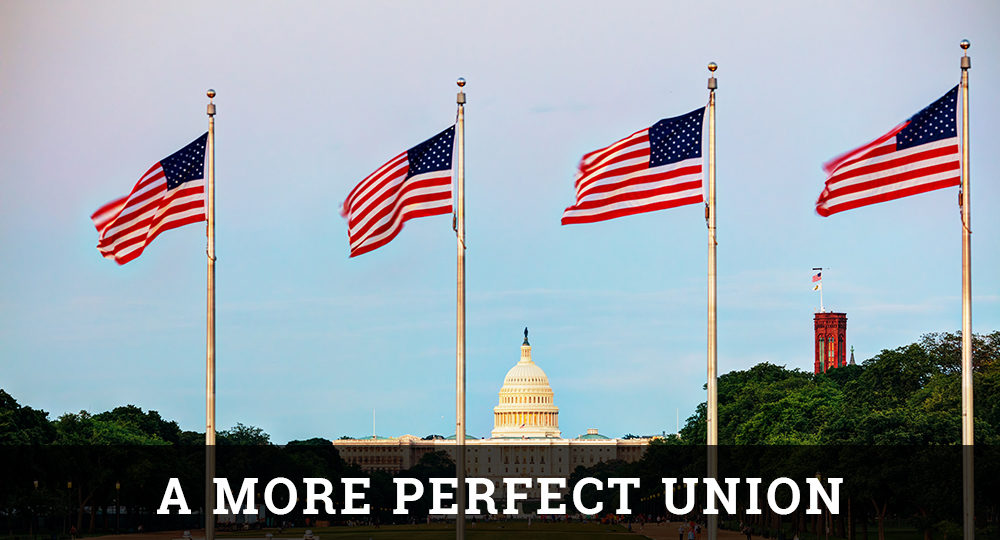A More Perfect Union Jul/Aug 2010
It all started when the Christian Legal Society (CLS), a fellowship group of Christian law students and lawyers, sought official recognition at the Hastings Law School, a part of the California public university system.
Official recognition brings with it access to student organization funds and the right to use campus facilities, including university communication channels to announce meetings and events. An officially sanctioned student group on campus, Outlaw, whose self-styled mission is to “eradicate homophobia,” objected to recognizing CLS because it excludes homosexuals from leadership and voting. CLS admitted that fact, of course, because of its belief in Scripture’s clear teaching regarding homosexuality. Yet CLS pointed out that everyone is welcome to attend its Bible studies and other events.
However, Hastings decided to bar CLS because it “discriminates” based on “sexual orientation.” CLS filed a lawsuit, arguing that its First Amendment rights were being violated; but a California federal judge ruled in favor of the school. So did the San Francisco-based 9th Circuit Court of Appeals, which didn’t even give the case the benefit of a fully developed opinion. Rather, it affirmed the school’s actions in a two-sentence decision.
Enter the U.S. Supreme Court. It accepted the case for argument and review, and by the time you read this column it will have issued its opinion. Regardless of the ultimate ruling, this case will be critically important for three reasons.
First, there is the heart of the case. A ruling against CLS means a public institution can require a Christian organization to deny a basic tenet of its faith as a condition of official recognition. Imagine the student chapter of People for the Ethical Treatment of Animals (PETA) being forced to accept deer hunters into its leadership; or the local chapter of the National Association for the Advancement of Colored People (NAACP) being required to give Ku Klux Klan members top positions.
One could argue that losing “official recognition” is trivial and doesn’t impact CLS’s core functions. That is exactly what the lower courts decided. But such reasoning ignores the fact that CLS is being discriminated against because it believes in the moral dictates of the Bible.
This case represents such a clear affront to the freedoms of belief, religion, association, and speech that one of the 100 Amicus Curiae (“friend of the court”) briefs filed with the Supreme Court in support of CLS was actually from a group called Gays and Lesbians for Individual Liberty. Even it had to admit CLS had been wronged.
Second, the CLS case brings into focus a nationwide attempt to force America to embrace homosexuality. The single most effective obstacle to that effort is the church. I testified last year in the U.S. Senate in opposition to a recent homosex-ual-rights bill dealing with employment. The proposed legislation gave little legal protection to Christian organizations that resisted hiring homosexuals. The organizations would then be faced with expensive lawsuits, large damage judgments, and attorneys’ fees.
A senator supporting the legislation made the political agenda crystal clear. The object, he said, was not merely to require Americans to tolerate homosexuality but to force full-blown acceptance of it. Up to now, most Americans have resisted. More than 30 states have amended their constitutions to disallow same-sex marriage.
Lastly, if the Supreme Court rules against CLS, the resulting legal principle will devastate the autonomy of Christian organizations. Any time a Christian group is viewed as having received some public “benefit,” such as tax exemption, it could be required to deny a fundamental principle of its Christian faith.
I have always argued that granting tax-exempt status to Christian nonprofit groups is not a matter of government bestowing a “privilege,” as some advocates of strict separation of church and state might argue. To the contrary, as the late Supreme Court Justice William J. Brennan, Jr. once noted, tax exemption for faith-based organizations is the only way government can effectively be kept from meddling with the inner workings of religious groups.
After all, the power to tax brings with it the power to investigate, harass, and destroy. If Thomas Jefferson’s use of that unfortunate phrase wall of separation between church and state meant anything in his famous letter to the Danbury Baptist Association in 1802, it meant this: the federal government should stay out of the business of controlling or regulating religion.
Yet many liberals view tax exemption as an unearned favor, a generous public benefit. The wrong ruling in the CLS case could encourage the IRS to require every tax-exempt church or Christian ministry to adopt a “non-discrimination policy” regarding homosexuality.
There is always the chance, though, that the Supreme Court will get it right. If that happens, Christian ministries will escape the governmental chopping block—at least for now. But pardon me if my enthusiasm for that prospect is tempered. A victory for CLS would be the fourth time since 1981 that the Supreme Court has had to warn a public institution to stop discriminating against Christians.






